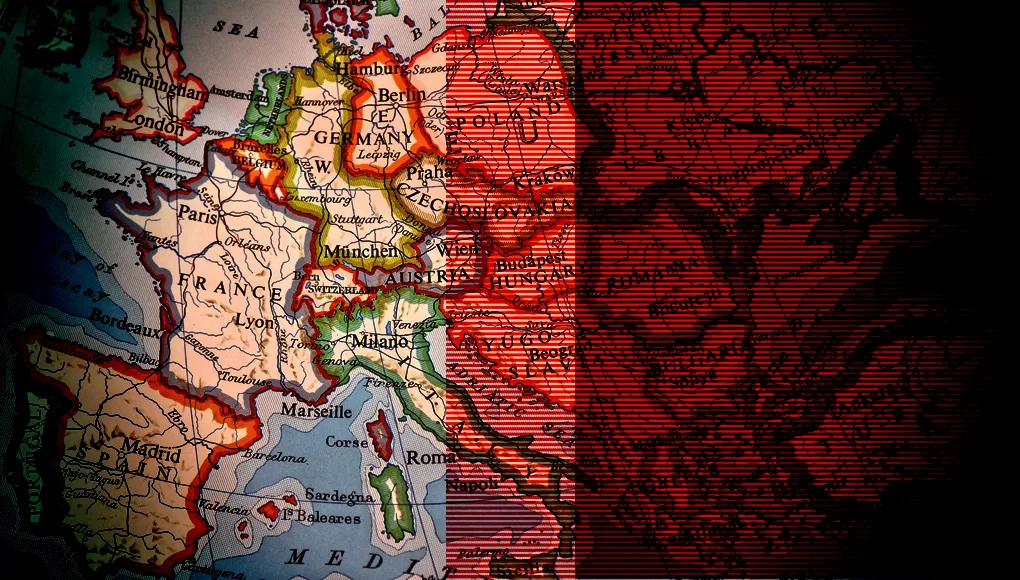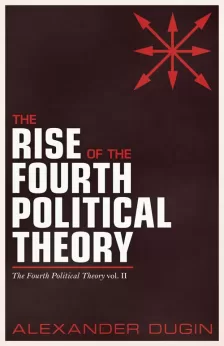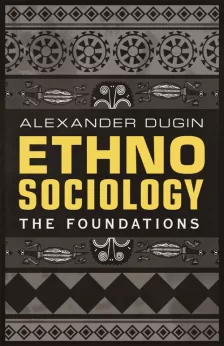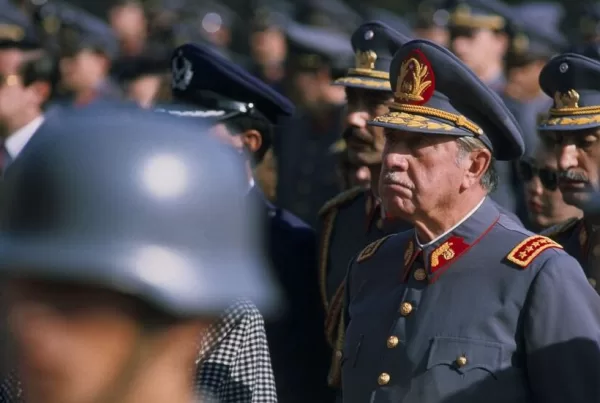‘Nationalism’ has become a pejorative in current political debates, but in reality nationalist movements originally unified people against foreign rule, and represented one thing above all: freedom. The current debate regarding nationalism in America also ignores the differences between the American and European traditions. But they are totally distinct and likely headed in different directions.
The idea of an American People, distinct from the British, recurs from the Declaration of Independence through the Preamble of the Constitution: ‘We, the people of the United States of America…’
The American Revolution inspired Europeans, but America exists in a fundamentally different geopolitical reality, being as it is surrounded by weak neighbours and fish, as Otto von Bismarck later observed. Moreover, even after the French Revolution the hereditary feudal class system remained a force in Europe, one that proved capable of surviving even Napoleon, despite the fact that he had not been afraid to arouse people against their kings.1 Those same kings, incidentally, often found this same ploy useful, since the people Napoleon conquered weren’t French, never mind that Britain, Russia and Austria also ruled foreign peoples. This created a predicament for the Allies after Napoleon’s defeat. But after twenty-six years of revolution and war, peace was sacred. Divine right monarchy restored order along with its own rightful place, that there should never be another ‘usurper of the peace’. The more secular allies of 1918 and 1945 would create a similar predicament for themselves, but one far more aggravated.
Through the intervening century, the mounting demands of industrial development strained the system of feudal obligations and privileges, pitting workers and rulers against each other. In 1830 the workers brought their grievances to the barricades across the continent, and once again in 1848.2
By this time, the armies of Europe had become civil gendarmes, putting down hardcore Jacobins and nationalists. Secret police infiltrated secret societies. But the Carbonari, students’ leagues and Free Masons continued to plot subversion. Giuseppe Mazzini became the siren of latent nationalists, which were concentrated more among romantic bourgeois and were less doctrinaire than the Jacobins, for whom Karl Marx became the ‘scientific’ prophet of mass revolution and uncompromising international class warfare.
Property rights were the dividing issue; these were essential to middle- and upper-class status, but in Marx’s view they were merely the means of oppressing those without. The Church was the next social institution to be undermined by Marxism and communal ownership.
The denouement of the 19th century came during the final days of the Franco Prussian War in 1871. ‘Red’ Communards seized control of Paris from the French Provisional Government while under German siege. Here again was a Robespierre and a Reign of Terror.3 It was finally defeated by French Imperial troops, released from German POW camps to the Provisional Government after their surrender, which liquidated the movement. Meanwhile, the united North German princes seceded from the Austrian Empire and, in Italy, Count Cavour crowned Mazzini’s dream: a united, independent Kingdom of Italy. Cavour and Bismarck had turned the Napoleonic ploy against their own princes as well as imperial Vienna. Nationalism had won.
And then, ‘peace broke out in Europe’. The nation-state proved the answer to another Napoleon, rather than harbinger of another.
For the next forty-three years, parliamentary governments ruled via constitutional monarchies or republics: Liberal Europe. Compromise was the rule, although the franchise was restricted to men of means and power was concentrated in the haute bourgeoisie and the aristocracy.
Standards of living improved. Liberalism meant progress: Positivism. But it wasn’t really the politicians who had brought the progress. Mid-century science had developed cogent theories of thermodynamics and electromagnetism which laid the theoretical groundwork for locomotives and dynamos, for predicting the direction of chemical reactions or the electric power requirements of a city, all of which significantly reduced risk in major enterprise. Moreover, the average man could buy stock in these enterprises, stocks which paid dividends. Here was a cooperative ownership scheme that no socialist had ever thought of. Moreover, it worked on the profits rather than the work. But Liberal politicians took credit. The short wars of 1852 to 1870 appeared part of this progress, of Darwin’s evolution: survival of the fittest. Coming on the heels of Comte de Gobineau’s An Essay on the Inequality of the Human Races, Darwin’s theory also became political – not to mention Hobbes’ Leviathan.
However, technical progress elevated commerce in national security as the populations of industrialized countries outgrew their agricultural capacity. Only via export markets could England or Germany pay for imported food and raw materials. Empire took a grim turn, and the ever more efficient weapons required to defend them contributed to their fall.
The British conveniently dubbed their nationalism the ‘white man’s burden’, the duty of advanced nations to uplift the unindustrialized nations, and keep them that way. The European empires remained in fact as mercantile as when the Americans had revolted.
No wonder, then, the profound Disillusion following the First World War. Falling from the heights of Positivism through four years of bloody military stalemate, Europe was left with nothing but disfigured men, graveyards and bankruptcy, victor and vanquished alike.
Lloyd George tried to justify the greatest war Britain had ever fought with the greatest imperial acquisitions, but fell flat against his own sanctimonious wartime propaganda.4 Only Woodrow Wilson and Vladimir Lenin adhered to the promise of self-determination of all peoples, but neither intended to share the world with the other, and providing every aspiring tribe with its own nation state proved impossible.
In fact, no government had formulated war goals commensurate with the unexpected scale of the First World War. When the armies stalled, nothing constrained ‘political warfare’: arousing traitors among enemy peoples with exorbitant promises while instilling a cult of nation and violence to prop morale within their own, with disregard to any consequence beyond victory. It was here that the radical movements of the interwar period began, coalescing around the 19th century International Marxists and Nationalists. However juxtaposed, they both hated the bourgeoisie and what remained of the hereditary class system, as well as the liberal parliamentarians who had brought about the most uncompromising of wars; but, when faced with unremitting economic calamity and civil wars, both continued preaching pre-war bourgeoisie compromises and even disarmament. Centre coalitions lost control as the frustrated masses flocked to the radicals.
More to the point, Liberal Spanish writer ‘Gaziel’ wrote that ‘Fascism is … the sinister shadow projected across the land by democracy itself, when its internal decomposition turns to anarchy. And therefore, the deluded concern that the triumphant Popular Front shows about a defeated fascism is nothing more than the fear of its own shadow.’5
There is, on the other hand, much to be said for weak neighbours and fish. American expansion expended itself in the westward stab, resulting in a bigger nation more than an empire, but a nation with its own industrial plant, markets, food and raw materials. Hegemony over the southern hemisphere intended to keep Europeans out more than to acquire colonies, although Progressives did acquire the imperial bug and a few colonies to boot during the Banana Wars.6 It became the duty of these evangelical constitutionalists to bring democracy to all the world and, later, to police it. This, however, is what imperial armies do. There had also been no lack of imperial diets or parliaments, either. But this was lost on Woodrow Wilson, as on FDR. The League of Nations, the United Nations or One World Government is merely empire without emperors or imperial armies. The Second World War was, in fact, no better orchestrated than the First, whatever the epic myths to the contrary might claim. It was largely improvements in petroleum engines that circumvented another stalemate. Giving the Second World War meaning becomes increasingly difficult as the rancour dissipates and the conflict itself appears little more than a continuation of the First World War – as indeed does the Cold War, for that matter.
The concrete results are that the 20th century destroyed the hereditary feudal class system along with the European empires built upon it, and that technical innovation has become as routine as the disruptions it causes. So has ‘Bonapartism’: wooing the people and then making them pay for the trick once in power. On the other hand, anti-colonial nationalist movements, Pilsudski, the ‘Young Turks’ or Mahatma Gandhi have brought about a world of nation-states. The USSR was the last of the Old World empires to disintegrate in 1991. Mass political participation has become the norm. Wikipedia publishes the forbidden knowledge of industrial technology for all the world to read.
What nationalism will become in the 21st century remains to be seen. Suffice it to say that ideologies change with circumstance, and those of the last century cannot be replicated. Islands, however, remain islands. Continents remain continents. And the notion of a people remains ambiguous as ever, while character is still destiny.
We do have before us, however, the opportunity as never before to choose wisely.
References:
1Frederick Artz, Reaction and Revolution, 1814–1832, Harper & Row, 1934, pp. 1–23, Chapters 1–3. The prevailing sentiment after Napoleon’s defeat was ‘Vive la paix’ more than ‘Vive les Bourbons’. The peace, however, belonged to the counter revolutionary Allies who promulgated ‘the most striking reversal in history’ at the Congress of Vienna. Later chapters deal with the disintegration of Metternich’s System and the Revolutions of 1830.
See also, Geoffrey Bruun, ‘Europe and the French Imperium’, Harper & Row, 1938. Napoleon Bonaparte was the last of the Enlightened Despots. Liberty, equality and fraternity had an entirely different meaning for him than it has for liberals, who consequently fail to understand the dictators of the 20th century as latter day Napoleons.
2 William Langer, Political and Social Upheaval 1832–1853, Harper & Row, 1969. The revolutions of 1830 were largely organized by artisans but it appeared to Karl Marx that only the bourgeoisie had benefitted. By 1848, when liberal bourgeoisie parliamentarians again challenged monarchies, Marx had workers organized for a neo-Jacobin ‘Communist’ revolution, complete with a resurrected Committee of Public Safety. The monarchs, less timid than in 1830, responded with artillery, giving ‘class warfare’ a somewhat literal meaning.
3Alistair Horne, The Fall of Paris, The Siege and the Commune 1870–71, Revised Edition, Papermac, 1990 The capture of Emperor Louis Napoleon III in the field left France without a government. French political opponents took advantage and formed a Provisional Government dedicated to continue the War of 1870 even though left with only reserve troops. French Communards then seized control of Paris during the ensuing German siege. Karl Marx attempted to mobilize provincial support along with Italian nationalist Garibaldi. The Provisional Government fled to the German camp at Versailles, surrendered, and then retook Paris and liquidated ‘Reds’ with French imperial troops released from German POW camps.
4Raymond Sontag, A Broken World, 1919–1939, Harper & Row, 1971.
The politics of the interwar period was a continuation of the ‘political warfare’ of World War 1, intended for manoeuvre and rather than negotiation or commitments. Circumstances changed so fast that treaties, once sacrosanct for years, now often became dead letters before they were signed. ‘Transactional politics’ is a current term for this practice, and the hypocrisy remains.
The “self-determination of all nations” became a useful slogan for use against empires. Mass politics required justifying one’s cause and demonizing the enemy as never before. Technical developments in mass communication provided unprecedented efficacy. The reality was that the Versailles concession states were unviable unless they were ethnically ‘pluralist’. Essentially, they were miniature polyglot empires and less tolerant than the larger empires from which they’d been formed.
Lenin, as Marx, saw nationalism as a step toward global communism, whereas Wilson saw the self-determination as an end in a world of capitalist republics. The contention continued through the Cold War.
For a general account of ‘political warfare’ in WW1, see Bernadotte Schmitt and Harold Vedler, The World in the Crucible, 1914–1918, Harper & Row, 1984.
For a view focussed on the Middle East and Lloyd George’s imperial acquisitions, see Eugene Rogan, The Fall of the Ottomans, Basic Books, 2015 and David Fromkin, A Peace to End All Peace, Holt Paperbacks, 1989. The difference between the American and British authors is amusing, although they tell essentially the same story of the events lying at the bottom of the Middle Eastern conflicts and its ‘political warfare’ today.
5Payne, Stanley, Fascism in Spain, 1923–1977, University of Wisconsin Press, 1999, p. 196
6Ivan Musicant, The Banana Wars, Macmillan, 1990.
Spain ceded Cuba, Philippines, Guam, and Puerto Rico to the United States under the Treaty of Paris, ending the Spanish American War in 1898. The war was instigated as much by Pulitzer-Hearst ‘yellow journalism’ as Alfred Mahon’s treatises on naval power. Policing the new empire intensified interest in a transoceanic isthmian canal, involving Panama, Columbia and Nicaragua, which were heavily indebted to European banks, as were Haiti and Dominican Republic. The money had largely been borrowed to finance revolutions. Between 1843 and 1915, 102 civil wars or revolutions had wracked Haiti, alone. America found no alternative to the European methods of seizing customs houses and establishing concentration camps to defeat the bandit gangs that sidelined as revolutionaries for hire, and quickly found itself a de facto imperial power, even when sincerely trying to establish viable governments as an exit strategy. Cesar Sandinista and the Red Scare added a new political dimension after World War One that wasn’t well understood at the time, but which proved to be the harbinger of Cold War and current U.S dilemmas: a combination of national liberation and communism that put a new face on long-standing grievances. The Philippines have been independent since 1946: Cuba, formally, since 1902, although American intervention continues to the present. Puerto Rico and Guam remain U.S. Territories.










The idea of nationalism does represent freedom, but also a cultural identity. The reason that European nations craved superiority over other nations had everything to do with power and this sense of freedom over land. You notice at the beginning of WW2 Hilter was surrounded by cheering crowds wherever he went. This is because the people of Germany were feeling empowered by their victories, but also the idea that they were spreading their cultural ideas and vision of the world onto others. Every empire was built off a sense of nationalism….. the Greeks and the Romans could not of achieved so much if they did not believe they were the best. In a modern context it proves to have a downfall to have such a high level of technological advances that the question of domination might also potentially annihilate life on Earth. This is the only reason the big empires have chosen the route of proxy wars rather than full on scale.